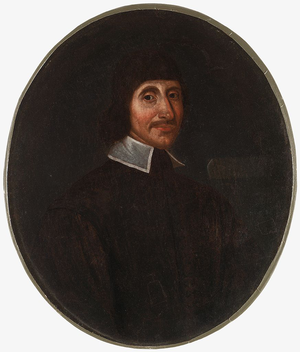
John Winthrop the Younger (1608-1676). He is described as America's first astronomer. Around 1660 he buys a ten foot telescope somewhere in Europe, which he brings back to Cambridge. It apparently pretty much sucks, not even being able to resolve Saturn.
So in 1663, he travels back to Europe and returns with a telescope that's smaller, but I can only assume better: "3 foote & halfe wth a concave ey-glasse".nescopes
In 1665 he uses his telescope to discover Jupiter's fifth moon. Except it turned out to be just a star in the wrong place at the wrong time.
In 1672 he gives his 3.5 foot telescope to Harvard, which seems to be Harvard's first telescope.nescopes heavensalarm
Don't be deceived by portraits of a John Winthrop with a telescope who is a well-known astronomer. That image is a painting of John Winthrop the Elder's great-great grandson, or the great grandson of this John Winthrop.
The artist for this portrait is apparently unknown, as is the year that it was painted. Still, Harvard considers it to be a valid portrait.winthropportrait
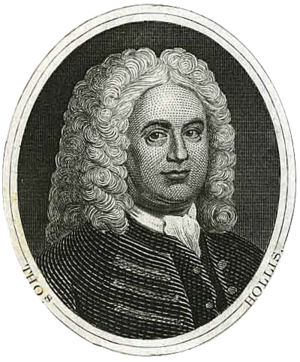
Earliest source: "Thomas Hollis (1659–1731)." Wikipedia. Wikipedia, 28 July 2015.wikihollis
In 1722, Thomas Hollis (1659-1731) donated a 24-foot telescope to Harvard College.winthropfirst It was housed in Massachusetts Hall. Later moved to Harvard Hall, where it, and all but one of Harvard's other telescopes were destroyed in a fire in 1764.firstfour(missing)
Thomas Hollis established the Hollis Professorship of Mathematics and Natural Philosophy in 1727, an important position for the growth of Harvard's science programs including in particular astronomy. This was the second Hollis professorship established, the first being the Hollis Professorship of Divinity, a controversial donation promoting the Baptist movement.sketchhist
This image is from an 1854 bank note from Holliston Savings Bank in Holliston Massachusetts. Holliston was named after Thomas Hollis. His image appeared on the one, two, five, and ten dollar bank notes from Holliston Bank.banknotes Apparently this is based on a painting by John Copley, which is based in turn on another painting by Giovanni Battista Cipriani in 1764, which was a copy of a painting by an unknown artist in 1723 (while Hollis was actually alive).
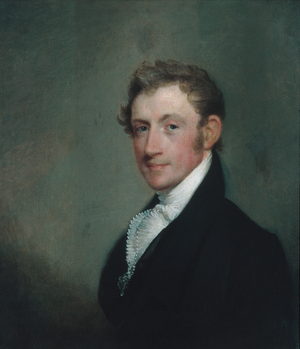
Image Credit: Gilbert Stuart
David Sears, 1815
Painting of philanthropist David Sears by Gilbert Stuart. Twenty eight years after this painting, David Sears will become the driving force in the donation campaign that builds Harvard Observatory and buys the Great Refractor. He makes two separate $5000 donations (about $150,000 2015 dollars).
The stone building that houses the Great Refractor is named the "Sears Tower" after him.
(Gilbert Stuart is a well-known portrait painter. His most famous work is an unfinished painting of George Washington, which was used as the basis for the one dollar bill. He did manage to complete several other portraits of George Washington, as well as John Adams, Abigail Adams, Thomas Jefferson, James Madison, James Monroe, and John Quincy Adams, who also plays a pivotal role in our little story.)
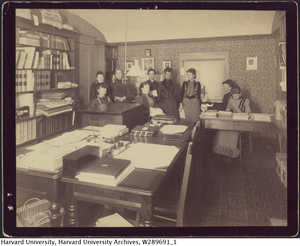
Earliest source: "[Observatory women computers], 1891." Harvard University Archives / HUV 1210 (9-3). Harvard Libraries, olvwork289691
A group photo of computers at Harvard together with Mary Anna Palmer Draper, aka Mrs. Henry Draper. She's seated in the middle. After her husband's death, she contributed a significant sum of money to continue her late husbands' dream of scientific astrophotograpy, leading to the Draper Catalog, an ambitious project of the Observatory. Many, though not all, computers were funded for this project.
Harvard dates this as 1891. It seems to be approximately the same time as other photos with similar groups of women, taken in the same room. I think there were two pairs of photos taken on different days.
The photo was taken in the long computing room (see 1876 floor plans) on the south side of the second floor (the top floor, excluding the dome) of the building. The photograph was taken facing east, and the doorway in the photo is the closet shown in the floor plan.
Left to right:
Note that Stevens is Mrs. Fleming's maiden name, and she did have other relatives in Boston, but so far I don't know if any of the other Stevens that worked at the Observatary are related.
[Observatory women computers], 1891
1891
General: The women depicted in this photograph analyized stellar photographs and computed data at the Harvard College Observatory.
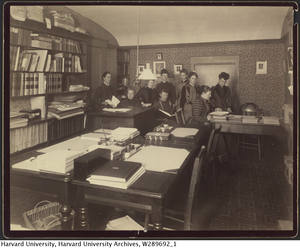
Earliest source: "Observatory girls with Mrs. Draper, 1891
Alternate Title: [Observatory computer room and staff], 1891." Harvard University Archives / HUV 1210 (9-5). Harvard Libraries, olvwork289692
Another photograph taken in the same place and on the same day as the previous, with the same people.
 Fine's Home
Fine's Home